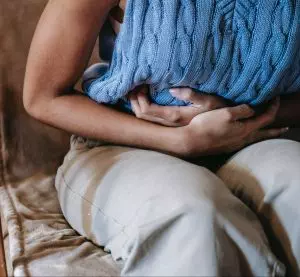By Xiaomei Cai, L.Ac., Ph.D. & Qineng Tan, L.Ac., Ph.D.

Diarrhea, bloody stool, fatigue, fever? These could be colitis symptoms. Ulcerative colitis is an inflammatory bowel disease (IBD) that causes swelling in the large intestine, abdominal pain, bloating and bloody diarrhea. Acupuncture and TCM can offer an alternative colitis treatment to help relieve ulcerative colitis symptoms.
Colitis is a gastrointestinal disease in which the colon—also known as the bowel, or the large intestine—becomes inflamed and can develop open sores, or ulcers.
Ulcerative colitis is the term for colitis that is caused by an autoimmune disorder. The immune system launches an attack on the tissues of the intestinal lining, causing inflammation and sores. It is similar to Crohn’s disease: an autoimmune disease that can affect any part of the digestive tract.
What causes colitis? There are several problems that can lead to abdominal pain and diarrhea, and sometimes it can be difficult to discover what is causing a person to have colitis symptoms.
Parasites, bacterial infections, or food poisoning can cause pain, inflammation in the colon, and diarrhea. For example, e coli bacteria, sometimes found in improperly cooked beef, can cause colitis symptoms. This is known as e colitis, or hemorrhagic colitis.
IBS (irritable bowel syndrome) symptoms can seem similar to those of colitis. People who suffer from IBS can have abdominal pain and diarrhea, urgency and mucus in their stool. However, IBS is considered a functional gastrointestinal disorder, not a disease. IBS does not cause permanent damage to the intestinal lining, while colitis can.
Ischemic colitis is a specific type of colitis caused by a blockage of blood flow to the intestine. This is more common in older adults, and can be the result of a blood clot in an artery, or low blood pressure due to heart failure or recovery from some major surgery. Some conditions, like lupus or sickle cell anemia, can restrict blood flow to the gastrointestinal tract. It could also happen due to a bowel obstruction caused by a tumor or hernia. Some medications can also restrict blood flow to the intestine.
TCM and acupuncture treatment, whether alone or as an adjunct to conventional treatment, can help relieve the symptoms of colitis by reducing inflammation in the intestine, helping to stop bleeding and helping to restore normal bowel movements.
Colitis Symptoms

Ulcerative colitis symptoms can be mild at first and become more persistent and/or severe over time. Some common symptoms of colitis, or IBD symptoms, include:
- Loose stool, loose bowel movements, diarrhea
- Urgency to go to the bathroom, feeling like you have to poop all the time
- Feeling like you have to poop, but not being able to
- Bloody stool, bloody poop
- Mucus in stool
- Abdominal pain
- Abdominal cramps, cramping
- Rectal pain
- Fatigue, feeling tired all the time, no energy
- Fever
- Weight loss
Symptoms of ulcerative colitis can come and go, or “flare up” at times. When symptoms abate, this is called “remission.”
Children can have colitis, which may cause them to not grow properly.
Colitis Treatment
Testing for IBDs might start with some basic blood tests and a stool sample test to see if there are any bacterial or parasitic causes of diarrhea. If inflammation needs to be looked at more closely to discover its location and cause, a colonoscopy or sigmoidoscopy may be done. Imaging—X-ray, ultrasound, or MRI—may be used to show if there is some kind of obstruction of the intestine.
If testing and treatment have ruled out IBD and other potential causes, a tissue biopsy may be used to diagnose ulcerative colitis, the autoimmune form of colitis.
Generally, once colitis or inflammatory bowel disease has been diagnosed, the main goal is to reduce inflammation in the colon. Anti-inflammatory drugs will usually be prescribed. Anti-diarrheal medications and pain relievers provide some symptomatic relief.
Ulcerative colitis is usually treated with a combination of anti-inflammatories and immunosuppressants. Unfortunately, these types of medications can have significant side effects. Long term use of corticosteroids can cause bone loss and swelling, while immunosuppressants can stress the liver and pancreas.
Newer pharmacological treatments include “small molecules,” like Xeljanz, which act as anti-inflammatories and immunosuppressants. However, these drugs have been flagged for potentially causing heart problems, and maybe even cancer.
When medications and dietary changes don’t help enough, surgery to remove part of the large intestine may be sought.
Acupuncture and TCM offer an alternative treatment for colitis, which may help relieve symptoms without side effects.
Can Acupuncture Help Colitis?

TCM herbs and acupuncture treatment are excellent modalities for helping to reduce inflammation. In the case of colitis and ulcerative colitis, the central problem is that the body is producing an inflammatory response in the large intestine that leads to pain and dysfunction. According to TCM theory, imbalances in the internal organs can cause heat, dampness, or blood stasis. In different people, the ways that colitis shows up may vary, depending on the pathogenic forces at work.
Acupuncture points to help relieve diarrhea, bloating, and bleeding in the colon will be combined with beneficial herbs to help clear heat and dampness. One study done in China showed that patients with ulcerative colitis who received acupuncture and herbal supplements in addition to conventional pharmaceutical treatments healed more quickly than those who did not receive TCM. They also reported feeling less anxiety and depression.
A systematic review of studies done regarding TCM for colitis concluded that acupuncture and herbs were effective compared to medical treatments.
Studies have shown that acupuncture can help balance the gut biome and help strengthen the intestinal walls.
Acupuncture has been shown to help people whose colitis is in remission to maintain better function.
TCM herbs, used in combination with conventional treatment, may help improve the healing of the mucosal lining of the intestine. One study showed that herbs helped stop bleeding from the colon in patients with ulcerative colitis.
Moxibustion has also been shown to help as a treatment for IBD, helping to relieve diarrhea, nausea, and abdominal cramping.
Acupuncture is believed, in part, to help regulate inflammatory bowel diseases by providing positive stimulation of the vagus nerve, which plays an important role in inflammatory responses.
Acupuncture Near Me for Ulcerative Colitis in Los Angeles and Santa Monica
Acupuncture can be an excellent adjunct to standard treatment for gastrointestinal disorders of all kinds, including: IBS, Crohn’s disease, Celiac disease, and Candida. At Art of Wellness, we have over 30 years of experience helping people with IBD and colitis to improve their quality of life.
*This article is for education from the perspective of Traditional Chinese Medicine only. The education provided by this article is not approved by FDA to diagnose, prevent, treat and cure human diseases. It should not stop you from consulting with your physician for your medical conditions. Traditional Chinese Medicine is based on Qi, which is an invisible force that usually cannot be observed by modern science. Because science focuses on testing ideas about the natural world with evidence obtained through observation, these aspects of acupuncture can’t be studied by science. Therefore acupuncture and Chinese herbs are often not supported by double-blind, randomized trials, and they are considered alternative medicine therapies in the United States.
